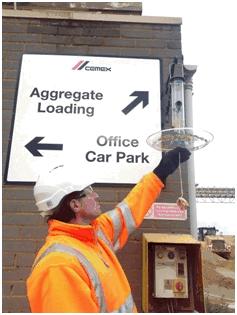Save our cockney sparrows, says CEMEX UK and RSPB

When was the last time you saw a house sparrow? You know those small, noisy birds seen around our towns that love our rubbish. In London, the house sparrow population has decreased by nearly 70% in the last 20 years. CEMEX UK and the RSPB are working together to save the ‘cockney’ house sparrow.
The staff on 12 CEMEX readymix concrete plants in London are helping the campaign by installing bird boxes on the sites and undertaking bird surveys to see how and if, sparrows use industrial sites.
The nest boxes have just been erected to provide shelter and it is planned for grass and wild flower seeds to be planted in unused areas of the sites to provide food.
According to the RSPB, who have been investigating the cause of the decline in numbers, it seems that lack of food is a major factor. The loss of wild flowers and grass areas in cities like London has resulted in less seeds and insects, two of the sparrow’s favourite foods.
Another factor found by a university study is the increased urban noise. Hungry chicks calling for their parents cannot be heard, resulting in failure to thrive.
A former volunteer conservationist Chris Leese, Vice President Readymix and Mortars, CEMEX UK comments “Many years ago I worked as a volunteer conservationist so this project is close to my heart. It is hard to believe that the once common house sparrow which we took for granted, has faced such significant decline and is now on the endangered list.
“Working alongside the RSPB in our London business we hope to help save the sparrow and bring it back to our communities, being the best for communities.”
RSPB London Manager Martyn Foster said: “CEMEX UK recognises the value of partnership and we know that we’ll do more to restore London’s sparrow population by working together than we could operating alone. We’re losing our wildlife in our towns, cities and the wider countryside. All nature needs our help and this is a great step forward.”